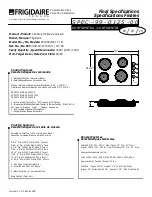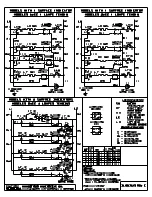
3
ELECTRIC COOKTOP INSTALLATION INSTRUCTIONS
Important Notes to the Installer
1.
Read all instructions contained in these installation
instructions before installing the cooktop.
2.
Remove all packing material before connecting the
electrical supply to the cooktop.
3.
Observe all governing codes and ordinances.
4.
Be sure to leave these instructions with the consumer.
Important Note to the Consumer
Keep these instructions with your owner's guide for future
reference.
IMPORTANT SAFETY
INSTRUCTIONS
•
Be sure your cooktop is installed and grounded
properly by a qualified installer or service technician.
•
These cooktops must be electrically grounded in
accordance with local codes or, in their absence, with
the National Electrical Code ANSI/NFPA No. 70—latest
edition in the United States, or with CSA Standard
C22.1, Canadian Electrical Code, Part 1, in Canada.
The electrical power to the cooktop must
be shut off while line connections are being
made. Failure to do so could result in serious injury or
death.
Provide Electrical Connection
Install the junction box under the cabinet and run 120/
240 or 120/208 Volt, AC wire from the main circuit panel.
DO NOT connect the wire to the circuit panel at this time.
Electrical Requirements
Observe all governing codes and local ordinances.
1.
A 3-wire or 4-wire single phase 120/240 or 120/208
Volt, 60 Hz AC only electrical supply is required on a
separate circuit fused on both sides of the line
(timedelay fuse or circuit breaker is recommended).
DO NOT fuse neutral. The fuse size must not exceed
the circuit rating of the appliance specified on the
nameplate.
2.
This unit can consume up to 7300W at 240Vac, a
circuit breaker of 40 Amp with wire gauge #8AWG
shall be used.
NOTE:
Wire sizes and connections must conform with the fuse
size and rating of the appliance in accordance with the National
Electrical Code ANSI/NFPA No. 70– latest edition, or with CSA
Standard C22.1, Canadian Electrical Code, Part 1, and local
codes and ordinances.
An extension cord must not be used with this
appliance. Such use may result in a fire,
electrical shock, or other personal injury.
2.
The appliance should be connected to the fused disconnect
(or circuit breaker) box through flexible armored or
nonmetallic sheathed cable. The flexible armored cable
extending from this appliance should be connected directly
to the grounded junction box. The junction box should be
located as shown in Figure 2 with as much slack as possible
remaining in the cable between the box and the appliance,
so it can be moved if servicing is ever necessary.
3.
A suitable strain relief must be provided to attach the
flexible armored cable to the junction box.
Electrical Connection
Connect the flexible armored cable that extends from the
surface unit to the junction box using a suitable strain relief at
the point the armored cable enters the junction box. Then
make the electrical connection as described on next page.
Electrical ground is required on this appliance.
This appliance is equipped with a copper conductor flexible
cable. If connection is made to aluminum house wiring, use
only special connectors which are approved for joining copper
and aluminum wires in accordance with the National Electrical
Code and local codes and ordinances.
This appliance is manufactured with a frame connected green
(or bare copper) ground wire.
Where local codes permit connecting the appliancegrounding
conductor to the neutral (white) wire (see figure 3):
The 3-conductor cord or cable must be replaced with a
4conductor cord or cable where local codes prohibit grounding
through the neutral conductor, including new branch-circuit
installations (1996 NEC), mobile homes, or recreational vehicles.
1.
Disconnect the power supply.
WARNING
WARNING





























